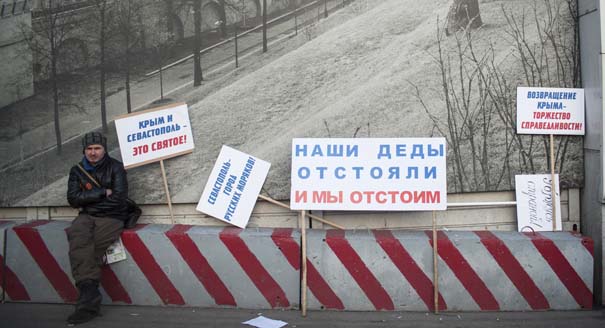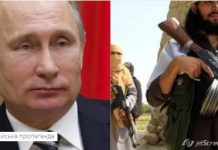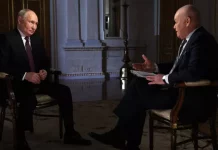
Russian public opinion on the Ukraine crisis is poorly understood. In most of the discussion of opinion polls, there is a strong focus on the very negative views Russian citizens express toward Ukraine and their general satisfaction with the takeover of Crimea.
However we gain a much more nuanced picture and some unexpected revelations if we study the poll data collected by the Levada Center since the first protests in Kiev in November 2013.
This data shows a Russia much less aggressive on Ukraine than outsiders might suppose. According to the most recent polls, 64 percent of respondents believe that Russia would benefit from having good-neighborly relations with Ukraine as an independent state. Even as fighting was raging in Ukraine at the end of last year, 60 percent of those polled had neutral views on Ukraine’s membership in the European Union, believing that the country should make up its own mind on this issue; only 22 percent disagreed.
In December 2013, most Russians supported a policy of non-intervention and were against giving Ukraine money or sending troops there. Today most Russians would like to see their country remain within its current borders (57 percent as of March 2015, the highest figure in the 17 years in which the question has been asked). 64 percent believe Russia shouldn’t keep the former Soviet republics under its control. Over half of the people (55 percent) think that the country should focus on its domestic problems, while 31 percent say that “geopolitical” and “strategic” interests trump economic and social issues.
How is it possible to reconcile these attitudes with the fact that Russians also unequivocally approve of the annexation of Crimea and continued aid to the rebels in Donbass, including sending arms there (but not Russian troops)?
To understand this paradox, we must understand how Russians generally characterize the Ukraine conflict. In focus groups most respondents displayed a noticeable reluctance to discuss the topic and the most common answer was “officially, there is no war.” Only about 25 percent of respondents agree that there is a war between Russia and Ukraine, while 65 – 70 percent complete deny this (in Ukraine these numbers are completely reversed).
It is telling that only 11 percent of those polled are certain that there are absolutely no Russian citizens fighting on the side of the Donbass militants. But the majority believes that these men are either volunteers (48 percent) or mercenaries (24 percent) rather than actual Russian troops.
Russians are virtually unanimous (95 – 96 percent) in denying their own country’s responsibility for anything that’s happening in Ukraine: the ongoing conflict, breaches of the Minsk Agreements, the shooting down of MH17 etc.
The West, and chiefly the U.S, is blamed for what has happened. This trend had already emerged by the end of the 2013, when the Russian reading and viewing public was convinced that the Ukrainian Maidan was orchestrated by the West. Just as in the Georgia-Russia war of 2008, most Russians believe that their country is opposing the United States rather than a neighbor. Three quarters of respondents believe that the West is taking advantage of the situation in Ukraine to “weaken and humiliate” Russia.
The general consensus is that Vladimir Putin’s policies in Ukraine are just a reaction to the expansion of NATO expansion and the threat faced by the Russian-speaking population of Donbass (46 percent and 43 percent, respectively). Both quantitative and qualitative research reveals the same responses–“Russia is not at fault”, “we were forced”, “we are defending ourselves”–which correspond closely with the words of high-ranking officials: “We didn’t start it; the other side did.”
State-run television is key in shaping opinion. For 90 – 95 percent of Russians it is their main source of information about the events in Ukraine and no more than a quarter of viewers doubt the objectivity of what they are seeing–in fact overall trust in objectivity of the media is actually rising. More than half of the population reports frequently (12 percent) or occasionally (46 percent) hears a point of view that strongly diverges from the official message, but dismisses it as untrustworthy Ukrainian propaganda.
However, the flood of information on Ukraine does not result in a better understanding of the events there. Only one third of the population is certain that they understand what is happening in Ukraine “well” or “very well.” Russians learn about the deaths of the Pskov paratroopers in Ukraine and other such stories, but only 14 – 15 percent of them are ready to believe that they were active-duty troops. Yet, as negative information accumulates, some changes in public opinion are occurring. For instance, right after Russia’s takeover of Crimea, half of the people thought that Donbass should follow suit; today only 19 percent support that scenario.
So most Russians follow events rather passively and without even strong sentiments about the loss of life. Overall we can identify two distinct groups in the general population. Around 20 – 25 percent of the public can be described as “hawks” who support the Russian military intervention in the east of Ukraine; they think in in terms of “geopolitics” and “national interests”, oppose Ukraine’s integration into the EU, sympathize with Yanukovych, etc.
On the other hand, approximately 10 percent of the population have sympathized with the Maidan protestors from the outset and support Ukraine’s moves towards European integration. The majority are simply indifferent: they don’t want to analyze the situation and take a particular position. When asked who were the men wearing green unmarked military fatigues in Crimea in 2014, the majority (53 percent) said that “it could have been anyone.”
A propaganda machine can only exploit sentiments and fears that are already present. The issue of Crimea was almost never publicly discussed, but in May 1998 77 percent of Russians wanted Crimea to be “returned to Russia” (half of them believed this should be done by referendum).
In June 1994, about 70 percent of respondents believed that Russia “should defend the interests of Russians” in the post-Soviet space. In late 2014, the same percentage supported the takeover of Crimea because it is “Russian land” and to protect it from Ukrainian nationalists. The popular belief that we need to protect “our own” and return “what’s ours” helped the Russian leadership overcome their reluctance to intervene abroad. In other words, we generally shouldn’t intervene, but we can when it’s “for a good cause.” Around half the public holds this rather crafty position now–up from one quarter a year ago.
Finally, for the majority of people (about 80 percent) the takeover of Crimea is proof that Russia regained the great-power status it lost with the collapse of the Soviet Union. Focus group participants euphorically reported, “Just two days and Crimea was ours!” or “Putin used to talk about the greatness of our country, now he proved it!”
The joy occasioned by the takeover of Crimea had somewhat diminished by end of 2014–but 80 percent of the public still believes that it was the right move. They see the continued standoff with the West and the exchange of sanctions and accusations as proof of the country’s significance on the global stage. “They don’t love us, they fear us, they want to weaken us, ” Russians believe, and that means “They are taking us seriously.”
So the authorities have used their propaganda on the Ukraine conflict for numerous purposes. They want to discredit the Euromaidan in the eyes of Russians, some of whom recently protested against the regime and they want to present themselves as the defenders of the country and their adversaries as tools in the hands of external forces.
Russian television’s portrayal of Ukraine as a failed and disintegrating state overrun by nationalist forces has mostly had the desired effect. “Just look at the Ukrainian horrors!” our respondents say. The takeover of Crimea combined with the great-power rhetoric has allowed the Russian authorities to reverse the long trend of falling popular support.
The strength of Russian propaganda rests on certain intrinsic core factors: a mistrust for the West that began to grow in the second half of the 1990s, the passive consumption of television content by the majority of the population, and a nostalgia for lost superpower status. Russians possessed these traits long before the onset of the Ukraine crisis. All the Russian authorities had to do was to identify them and exploit them–and they did so without thinking twice.
By Denis Volkov, Carnegie Moscow Center
Denis Volkov is a sociologist and an expert at the Levada Center in Moscow





